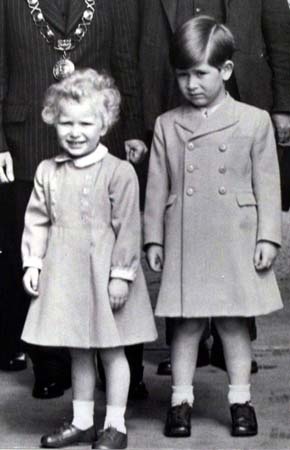At six, Prince Charles had yet to fly on an airplane but had a slew of technological devices at his disposal. From “The Boy Who Lives in a Palace,” a 1955 Collier’s Weekly portrait by Helen Worden Erskine of the lad raised for a throne which never materialized:
In his five-room nursery suite at Buckingham Palace is a TV set; over his bed is a microphone so sensitive that it instantly registers, in the quarters of both the chief nurse and palace detectives, his slightest cough, as well as his breathing. He has a private telephone connected with the main palace switchboard. It holds no mystery for him; he began talking into it when he was so small he had to stand on a chair to reach it. At that age the calls were usually for Mummy or Papa in some far-off place. Now he has grown enough to use it normally, although he’s still impulsively apt to ring the chef at odd hours and say: “Send Charles ice cream, quickly!”
Mechanical devices intrigue the little prince. He clambers over the fire engines which are part of the equipment on all the crown estates. He is keen about his mother’s private plane and his father’s helicopter, and begs to go out, rain or shine, to see Papa take off from the palace lawn. Once, when court photographer Marcus Adams was taking his picture. Charles climbed a chair and peered into the lens. “Everything’s upside down,” he reported, surprised. Then he ran back to the sofa where he’d been posing and stood on his head—”to make it right for Mr. Adams,” he explained.
Despite his parents’ air-mindedness, Charles has not yet flown. In his journeys among the halfdozen fabulous palaces and castles he can call home his choice of a coach-and-four may be either a Rolls-Royce or a special train bearing the royal coat of arms. On his recent trip to Malta, his first outside Great Britain, he traveled on the queen’s new 412-foot, $2,000,000 royal yacht Britannia.
On his travels, the young prince is always accompanied by his own retinue: Superintendent T. J. Clark of Scotland Yard, chauffeur Jim Cheevers. chief nurse Helen Lightbody, personal nursemaid Mabel Anderson, governess Katherine Peebles, a palace policeman and, as a rule. General Sir Frederick Browning, Comptroller of the Queen’s Household.
As Duke of Cornwall (his most important title), Charles is entitled to an annual income from farm products and rents equivalent to around $300,000 a year. He will draw only $36,000 of the total annually until he is fifteen; from then until his eighteenth birthday he will get another $90,000
a year, after which the entire income will be his.•

